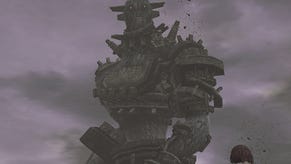"Make it Biblical:" How Vagrant Story Changed Game Localization
INTERVIEW: Alexander O. Smith and Rich Amtower go in-depth on the game that helped elevate localization into an artform.
This article first appeared on USgamer, a partner publication of VG247. Some content, such as this article, has been migrated to VG247 for posterity after USgamer's closure - but it has not been edited or further vetted by the VG247 team.
Things were looking pretty good for SquareSoft in 2000.
Just three short years earlier, the developer had finally broken American audiences of their widespread RPG ambivalence with the release of Final Fantasy VII. An unqualified smash, it's practically useless to go over the details yet again of a game that's so widely remembered and endearingly adored all these years later. But for everything that made Final Fantasy VII forward thinking, it would also put a period at the end of a long-standing problem with not only Square, but most other Japanese developers and publishers: its translation.
As a company that released very long and equally verbose games, this was a problem needed to be addressed, and quickly. Subsequent translations were exponentially better, of course; but though they were certainly Square's breadwinner, they weren't their only property. And still, even they weren't perfect. The beginning of the new millennium, though, was going to change all of that.
Released that May in North America, Vagrant Story was a significant step forward for English localization. A taut, lean story of dark medieval intrigue and magic, it was a game with a depth of language still uncommonly used to this day. I recently had the opportunity to interview localization editor Richard Amtower and famous translator Alexander O. Smith over email on their breakthrough early work in the field and to reflect on the rise of localization as a craft that truly mattered.
(Note: Answers have been edited for clarity and remove redundancies)
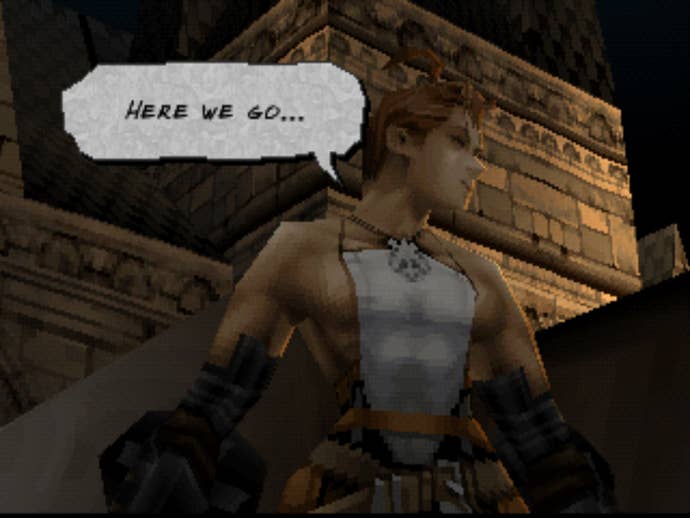
The People Who Brought Vagrant Story to Life
USgamer: Before we get to the game, can you explain your individual roles? Alex is listed in the credits of the game as the translator, but the manual leaves you him out and lists Rich and Brian Bell as editors. Can you take me through the differences in what you were doing?
Rich Amtower: (laughs) Wow, what kind of editor misses something like that when he's editing the manual... I was an editor. Alex was the translator. Alex drove the creative vision for the writing on this project, and I absolutely embraced it and did everything I could to help polish his work and bring out the best in it. The sad irony is that I probably edited that manual at some point? But yes, Alex translated, and I edited. Alex, did Aziz translate on this with you?
Alexander O. Smith: I had no idea the manual said that, either! Aziz Hinoshita did not translate on Vagrant Story, he hadn't joined the company yet at that point if I recall correctly. The first major project I did with Aziz was Final Fantasy X. Amanda J. Katsurada did help translate some of the menu material in VS, however, and I remember that Brian Bell, who possibly wasn't even officially on the project, had lots of good comments during the editing phase.
USG: How did each of you get attached to Vagrant Story? Were you assigned or did you choose to work on this. What drew you to it?
Alex: I was initially assigned to VS as the understudy of another translator (Sho Endo, also on Final Fantasy Anthology) as it was my first big wholesale project, having only done portions of Final Fantasy VIII and FFA by then. However, there was a production delay, and by the time things really got started on VS, I had Parasite Eve 2 mostly under my belt (PE2 translation continued alongside VS translation) and Endo-san had moved on to other things. I suppose it could have been reassigned entirely, but by that point I'd already gotten a taste of the game setting and the writing, and was pulling every string I could find to get on the project. I think it was the pseudo-medieval setting of the game that spoke to me in a way that the sci-fi/fantasy of the more recent FF titles hadn't, and the storytelling was so on point. Shout-out to Matsuno!
Rich: At that time, Brian and I edited everything that came through our doors. When I started as an editor, my first project was Final Fantasy Anthology, which Alex was lead on. That's how he and I first developed our working relationship. We established what I consider a good rapport, a good understanding of what one another's linguistic preferences were. It made editing Alex a breeze, because I knew how much room for creative feedback I had and what sort of thing he was looking for. Like I said, I worked on Vagrant Story because I worked on just about everything, but Vagrant Story appealed to me because of the comic-book presentation of the text, the visual style and design of the characters, and the tone and voice of the game itself. I wanted to do my part to make the text support the visuals and gameplay, because it was so clear to me how much passion the development team brought to the game.
USG: Tell me about the culture of Square's translation team at the time. This was a post-Metal Gear Solid world and the average player was beginning to notice quality localization. Vagrant Story came at the close of the PSOne's life cycle, so were you working with a larger team at that point? Was there even a localization division?
Rich: Alex was based in Japan by this time, and I was in America, and SquareSoft was in Costa Mesa. We communicated entirely through e-mail and through comments in the files. Square's translators always had the final say over the shape of the text, and my role was... advisory I suppose is the best way to put it. So I had to work to build relationships with all the translators so that they would trust my feedback and implement it. It was a relatively small team, very much like a family. Alex can speak more to what it was like on the translator side, but as an editor, my goal was always to make the translators shine, to make the games shine—we were enthusiasts, we were passionate, we were driven. But I think that's just what the game industry draws to it—people who are passionate about doing their best work.
Alex: This was still very early in the life of the Square localization department, which at that point (in Japan, at least) wasn't even a proper department of its own, having been grafted onto the IT "systems" department. It was also early in the transition of localization work from being based primarily in the states, to being done almost entirely on the Japan side, with the improved access to the dev team that entails. At that point, there were still more translators in Costa Mesa than in Tokyo. We hadn't settled on many 'best practices' yet either, so there were still non-native English speakers in lead translation positions, and a lack of consistency from project to project on basic things like formats and what applications to use. Usually that question came down to a simple text editor vs. Excel, then. These days, it's all excel or proprietary localization tools. It was a bit of a wild west at times, but as Rich says, the small size of the team meant that we just approached things on a case-by-case basis and just worked it out.
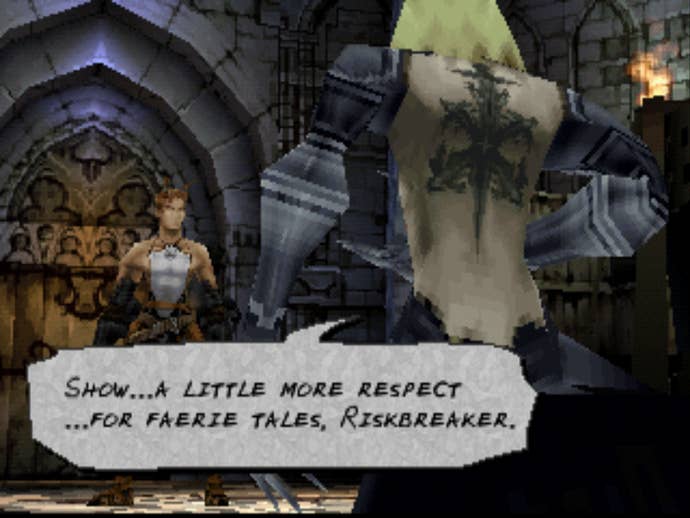
"Make it Biblical"
USG: At what point did the translation process start? Was it very deep into development by then?
Alex: It began in fits and starts. The very first thing we had to do (back when I was still understudy to Endo-san) was translate the opening scroll text. Our instructions were to make it sound "biblical." Endo-san translated it, I rewrote it, and then the project stopped for about half a year, during which I picked up Parasite Eve 2 from a translator who left the company. Development was still ongoing by the time I started translation in earnest, however. I remember going in to talk to Matsuno a few times about adding some English to the Japanese version of the game—mostly silly achievement-style titles, and there were team members still around (in those days, once a game got approved, most of the team would go on a well-deserved vacation) to help pick the English font and otherwise assist with the technical side of things.
Rich: As the editor, I joined late in the phase, so what Alex said!
USG: Let's get to the Japanese script. There seems to be a sentiment around the internet that the original script was fairly boilerplate by RPG standards. Was this true? Where did you start with adding your own spin to it?
Alex: As for the script being fairly boilerplate, I'd say yes and no. While the style of the writing is fairly modern and straightforward, the economy of dialogue, strong characters, and excellent pacing were really unusual for a Japanese script at the time, and are light on the ground even now. Part of the spin added came as a reaction to the rich setting of the game, not to fix any "shortcomings" in the script. If the setting is a pseudo-medieval European setting, while the Japanese language should stay fairly standard (there weren't many Japanese speakers in medieval Europe), the English really wants to at least nod its head toward that time. There are other things that English likes to do that Japanese doesn't that fit the setting as well: imagery in wordplay, for instance. An example from the game text has two soldiers talking about "magick."
SOLDIER A????????????????
"??"?????? SOLDIER B
…???????????
??????????????
"????"????????
A direct translation of these two lines would sound something like:
SOLDIER AIs this "magic" stuff really that easy to use? SOLDIER B
If you believe the studies of ancient legend, there were these "grimoires" that let anyone use it.
This is exposition, sure, but couched convincingly in dialogue that helps build the characters of the two soldiers, so classic Matsuno. Good stuff, doesn't need any fixing.
The direct translation is fine too, really, very clear and doesn't stray from the intent or characters as presented in the Japanese, as long as we're just looking at the text. But consider the setting, and we start wanting the text to do a little more to flesh out our world in English.
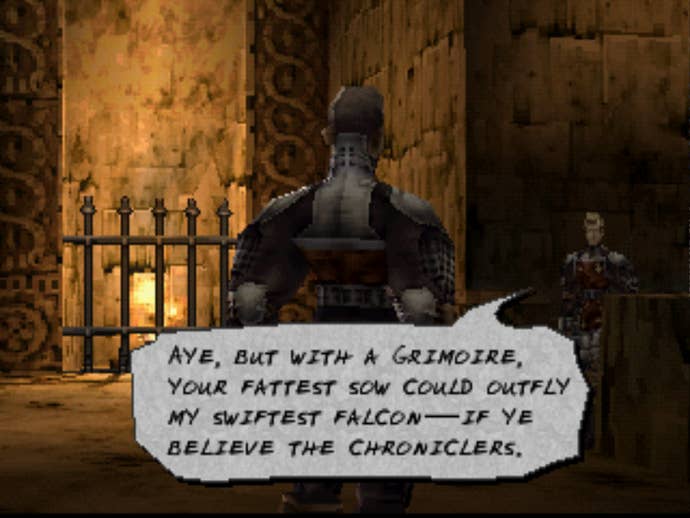
Here's the final text:
SOLDIER A...Swine'll take wing ‘fore the likes of us use magick, my friend. SOLDIER B
Aye, but with a grimoire, your fattest sow could outfly my swiftest falcon—if ye believe the chroniclers.
All the information from the original text is there and the characters haven't changed significantly, but the window dressing has changed pretty dramatically in order to breathe some life into the period setting via the language.
You can call that "improving" on the original script, but the original was fine in Japanese—great, even. You could also call it giving it our own spin, or even needlessly embellishing, but everything in the English is directly inspired by the Japanese text and characters. At the end of the day, we just took what was there and did our best to write the way we would have expected to see in that story had it been originally written in English.
Rich: I do remember asking Alex to walk me through his process, during the VS localization. He gave me the rough translation and then showed me where and how he embellished and built on the Japanese text, how he used the visuals to drive the writing so that the whole game came together as a cohesive experience. When I got his text, it already looked beautiful, and my edits covered a few basic categories. I would edit for grammar and spelling, of course. I also would edit for clarity and for simplicity—how can we take a sentence and reduce it to what is essential, reduce redundant words, make the language have the most impact, that sort of thing. Finally, I would offer suggestions on different writing directions for Alex to consider.
I remember one specific example where Ashley, I think, used a hunting metaphor involving rabbits. I mentioned that there was a commonly recurring medieval metaphor related to hunting harts, and that it had a nice and appropriate double meaning that Alex could play with. I gave a suggested rewrite, and Alex liked the direction, so he went with it.
Alex: That's right! There was also a lot of nudging of words going on to help support the imagery in the game. In the original, the city of Lea Monde is referred to as a "farm" for undead, but this was changed (with team approval) to a "spring," and all the words related to the dark power of the place changed to fit that theme—words like "surge," "stream," and "well."
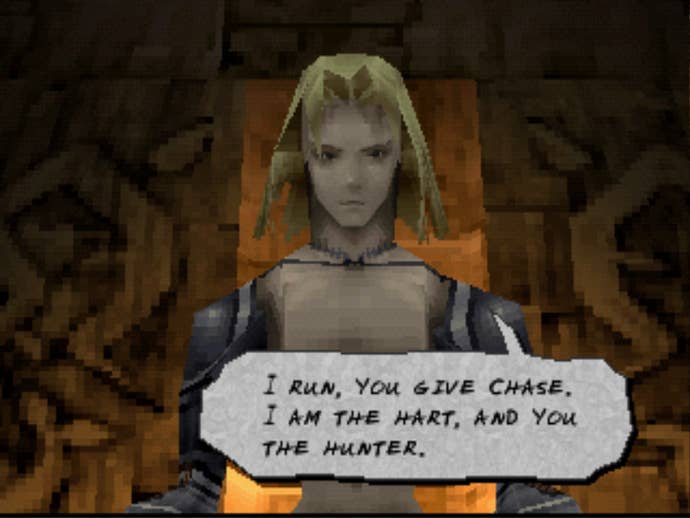
Rich: All of this took place within the .txt files that contained the game text. We would revise the files and send them to one another via e-mail, rename, redate, and send back.
The files contained the Japanese text, commented out (with semicolons), the English text with any tags that represented line breaks, and then any comments from Alex to me or from me to him. Mine always looked like this: ";///richsez: [whatever]"—the semicolon made it a comment so the game code would ignore it, and the "///" made it easy to search a file specifically for localization comments. The "rich sez" was just for fun... There would often be a string of comments on lines as translators and editors discussed the text.
Alex: An example, featuring comments from all three of us. Usually it was just comments from Rich which I implemented.
ASHLEY?Don't move, Sydney!
I've got a bowgun aimed at your heart! ;///brian: the thing looked more like a crossbow or hand crossbow. i say this only because gun is a modern word that probably wouldn't appear in this setting.
;///alex: again, that weird thing with new words and concepts showing up in this medieval setting. That thing he's holding is definitely a hand crossbow, but I think bowgun might be acceptable in the quasi-medieval context of VS... At least, that's what I thought at the time. Any strong feelings about this?
;/// rich sez: I was okay with bowgun, given the context. bolt-thrower? boltgun? that's a little "warhammer 40k," though... bowgun is fine...
;///brian: bowgun it is!
Rich: This shows some of the back-and-forth and internal discussions we'd have. You can see how conversational it is, as we debated direction, offered new suggestions, and resolved the debate—sometimes without any change at all, as you see here. It was important for us to make sure every writing decision was well supported by the game.
USG: How long did the whole process take, and can give any details about it?
Rich: Yeah, I don't remember. That was ages ago. And again, I was near the end of the project. Alex was involved far earlier than I was.
Alex: I'm afraid I don't remember exactly myself, but it was very short as those things go. I remember a lot of late nights bleeding into early mornings bleeding into bleary-eyed days. Not counting the false start and the half-year wait for the game to get going again, I'd say it was all done in two months or so. Then again, it's a pretty short script compared to the giants of the RPG world.
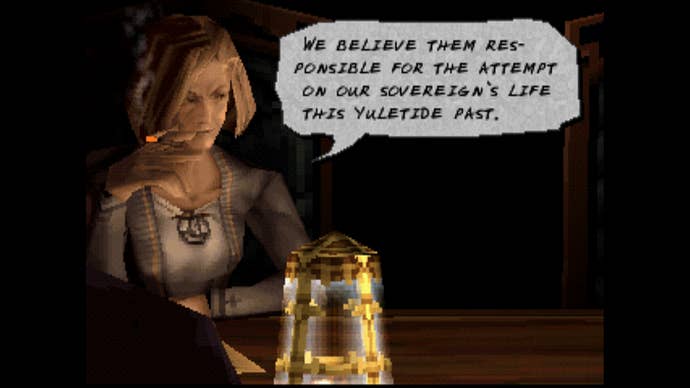
USG: Since characters like Rosencrantz and Guildenstern were obvious Shakespeare references that were found in the original Japanese text (at least, from what I understand), was that the jumping off point for the tone or dialect choices for the translation?
Alex: It was a push in the right direction, I'd say, but the story was already pretty Shakespearean in its characters and visual style without the direct references. That said, I don't think the English script we ended up with was necessarily Shakespearean in its language. The wordplay is pretty limited, and while we did go little archaic, we didn't get that far out of the 20th century. If anything, the (recently-released at the time) book "A Game of Thrones" was a stronger stylistic influence for me.
USG:This is a pretty dense script for being a relatively short game. Are there any subtleties that you think players have overlooked in any of the characters?
Rich: I can't speak to the characters, but for the dungeon rooms themselves, each of the names was hand-crafted by Alex and packed with homage to interesting and mutually beloved things. Also, I think we tucked a reference to The Eye of Argon away somewhere in there.
Alex: Yeah, the room names were a fun challenge, because the Japanese names were very long, and we didn't have anywhere near the space in English to directly translate, which gave me free reign to translate very, very loosely. I also took a queue from Matsuno's many homages to Queen songs and lyrics, by throwing in some Bauhaus references in keeping with the gothic feel of some of the areas in the game. (As I recall, Rich had sent me a vast collection of Bauhaus and Dead Can Dance, and I listened to both of these non-stop throughout the entire project—and throughout my 10-day stay in the hospital with nasty pneumonia just a little while after the project wrapped.)
Some samples:
?????????????Direct Translation: Mineshaft where (someone) spent all their strength for the one they loved.
Final English: The Passion of Lovers ???????????
Direct Translation: Stairway where (someone) danced a dance of joy after drinking cheap wine.
Final English: Bacchus is Cheap ????????
Direct Translation: Stairway where (someone) collapsed from overwork.
Final English: Work, Then Die
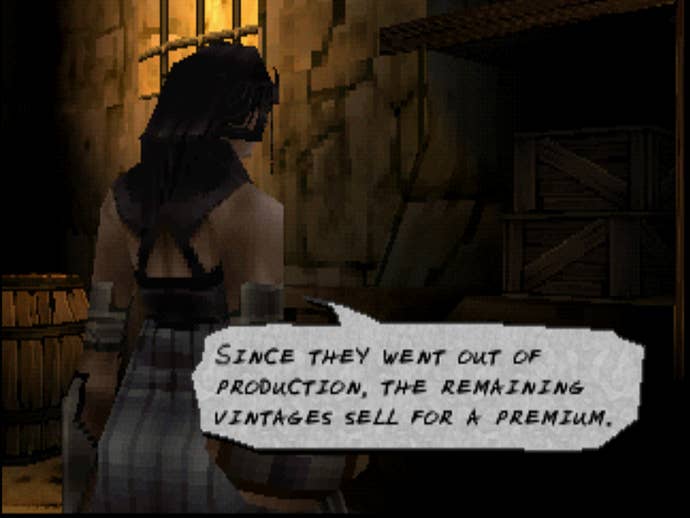
USG: Most video games tend to be very plot driven, but VS has some nice quick character moments, like Merlose mentioning rare wine. Did you insert things like that or were you asked to inject the script with a little more color?
Alex: The wine reference was in the original. Other than the exception of the room names above, we really didn't add anything specific like that as far as I can recall. All praise to Matsuno!
USG: This is maybe one of the most no-nonsense, deadly serious games ever written, as many Matsuno games tend to be. The game doesn't have anything even close to comic relief. Was it refreshing to move on to something a bit sunnier after VS?
Rich: While this was going on, Alex and I were working on Parasite Eve 2, which... isn't exactly sunny, ya know? But I think it's refreshing just changing projects at all. The appeal of this job has always been the constant shift of it. I might be working on Vagrant Story for a while, but then I'd have come off of, I don't know, FFIX or Front Mission 3 or some other completely different project. It was constant change, constant readjustment, and constant learning, which was itself very satisfying.
Alex: What Rich said! I'd add that while VS was a comfortable place for me to start, I had a lot of fun moving on to lighter fare in games like FFX, and outside of Square, straight up comedy, like the Ace Attorney series. Definitely always a learning curve! You'd think it'd get easy after 15-20 years of this, but so far, no luck.
USG: Any other major differences from the original text that you can think of that you'd like to share?
Alex: One minor point was the use of the word "terrorists" (??) by one of the Duke's men to refer to Ashley's crew. That struck me as anachronistic in a bad way, and I wrote around it in the translation. It wasn't something I cleared with Matsuno or the team, as I recall, but I'd probably make the same decision today.
USG: Any other large challenges with the translation that you can recall?
Rich: I'm a comma pusher, man. I don't know.
Alex: Rich sells himself short—his guiding hand was instrumental in shaping the language and the tone of the translation. I don't know if "challenge" is the right word, but I often feel like every game or book sets its own bar in terms of the quality and commitment it demands of the translators. The better-written and realized a game is, the better the translation needs to be to make it all work. On VS, the bar was set very high.
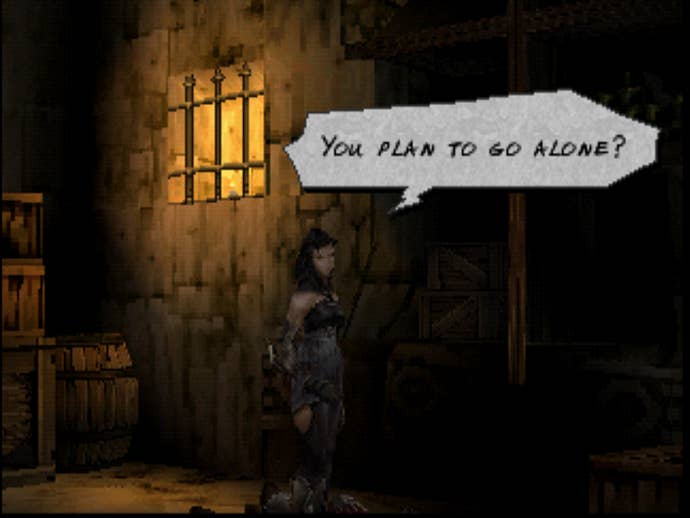
Localization Finally Mattered
USG, this game is the first time that people were taking notice of your work. Can you speak at all toward what this did for your career?
Alex: To have reviews of a really good game that went out of their way to specifically mention the translation was huge in the short-term, helping me and other translators at Square internally make the case that yes, localization mattered, and needed to be taken seriously. In the long-term, on a more personal level, it gave me the confidence to enter localization projects from the viewpoint of a creator, rather than just a mechanical cog in a localization black box that takes text in one language in, and spits text in another language out. Granted, you have to play both roles to do this job, but having access to that creative mode of localization has really made my career what it is today, and VS started it.
USG: For both of you, this game is seen as a major accomplishment in RPG localization at a time when other publishers still weren't giving translation any real thought. Looking back, I'd like to think (or hope) that you're proud of the work, but is there anything that you'd change about it? Anything you'd like to say about its legacy as something of a turning point for localized RPGs?
Rich: This remains one of my favorite collaborative experiences, a moment where a small handful of people focused their attention on the best possible writing, where communication and the sharing of ideas constantly pushed us to improve our work. I felt and feel very proud of the work I did at that time, and it was a joy to work on, because I worked with people who cared deeply about giving the American audience the best possible experience. It's a powerful experience, working toward a such a clearly articulated common goal.
Alex: I can't articulate that any more clearly myself! I'm plenty proud of the work as we did it at the time. My approach to a lot of the challenges VS presented has changed over the years, so I'd be interested to see what I'd do if I had to translate it today. Or even better, if I had to translate Vagrant Story 2! (Old memes never die...)
USG: In a tweet a few years ago, Mr. Matsuno stated that this game wasn't part of the larger Ivalice mythology and had been sort of retconned in there. Was that a decision by you the translators, or by SE? Alex, from working on Final Fantasy XII where terms like "Riskbreaker" and "Grand Grimoire" pop up, was it your call to make the VS references or did it come from the other scenario writers?
Alex: A lot of the VS stuff was already in FFXII. I did run with it a little bit by adding a character into the text of the FFXII Bestiary. Every once in a while, we get a snippet of writing from the "great naturalist Merlose." My nod of the head to an old friend.
USG: Dumb question: Rosencrantz mentions "measuring swords" before his boss fight with Ashley. An intentional joke about their "manhood?"
Rich: A gentleman never totally acknowledges whether this is absolutely the case or not.
Alex: Ahem! Just so.

